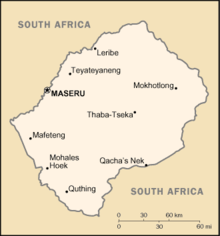1986 Lesotho coup d'état
 | |
| Date | 20 January 1986 |
|---|---|
| Location | |
| Type | Military coup |
| Motive | Regime change |
| Organised by | Justin Lekhanya |
| Participants | |
| Outcome | Coup succeeds
|
The 1986 Lesotho coup d'état was a military coup that took place in Lesotho on 20 January 1986, led by General Justin Lekhanya.[1][2][3] It led to the deposition of Prime Minister Leabua Jonathan, who held the office since 1965 and assumed dictatorial powers in the 1970 coup d'état, after the general election was annulled.
General Lekhanya announced the creation of the Military Council, which would exercise all executive and legislative powers in the name of King Moshoeshoe II. Eventually, a power struggle developed between Lekhanya and the King, with the latter being forced into exile in the United Kingdom in February 1990,[4] and officially dethroned in December of that year.[5] Lekhanya himself was deposed in the 1991 coup d'état, led by Colonel Elias Phisoana Ramaema.[6]
References
- ^ Alan Cowell (20 January 1986). "MILITARY COUP REPORTED IN LESOTHO AFTER CRISIS". The New York Times. Retrieved 13 January 2022.
- ^ Alan Cowell (21 January 1986). "MILITARY TOPPLES LESOTHO LEADER; CAPITAL JUBILANT". The New York Times. Retrieved 13 January 2022.
- ^ "Coup in Lesotho delights citizens -- and neighboring South Africa". Christian Science Monitor. Retrieved 3 January 2022.
- ^ "Lesotho Strips King of Power". The New York Times. Reuters. 22 February 1990. Retrieved 13 January 2022.
- ^ "Lesotho Army Ruler Declares Exiled King to Be Dethroned". The New York Times. Associated Press. 7 November 1990. Retrieved 13 January 2022.
- ^ Christopher S. Wren (1 May 1991). "Lesotho's Military Leader Ousted by Army Officers". The New York Times. Retrieved 13 January 2022.

